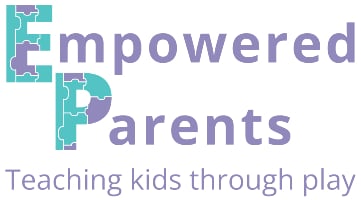Childhood is a time filled with excitement and wonder. It is also a period in which kids learn a great deal, in order to develop physically, cognitively, socially and emotionally.
Strong listening skills are connected to all four of these areas.
Here’s why listening is important and how to develop this skill with simple ideas.
What are Good Listening Skills and Why are they Important?
Aside from being physically able to hear well, listening is connected to what our brain understands and how it uses the sounds we take in and process.
In turn, these factors relate to many other aspects of learning.
Auditory perception and discrimination of sounds are essential for kids to develop speech and language skills. These are important while they are learning to speak, read, spell and write.
Children who are able to listen to others and understand what is being said manage to effectively follow directions while in school and at home.
They take in many details about everything that goes on around them through listening.
Kids who are good listeners tend to be successful in speaking, socializing, and communicating with others, which can build trust and respect among peers.
These children are more apt to be heard and understood, which can earn a certain sense of belonging and emotional satisfaction.
In general, kids who are effective listeners cope better at home and in school.
How do You Teach Listening Skills to Toddlers and Preschoolers?
There are many fun ways to develop listening skills in the classroom and at home.
Listening skills can be taught directly through everyday interactions, listening activities and targeted games. They are also learned during free play.
Reading to children and telling them stories are excellent options for encouraging listening at all ages.
You can teach listening skills throughout the day as you speak with, listen to, and respond to your children. For them, you are a model of active listening.
Try to avoid negatives, beginning with “Don’t,” which can cause kids to tune you out. Instead, focus on positives, including a “thank you” when they have listened and followed through on your requests or suggestions.
4 Types of Listening
We use various types of listening for different reasons. These include discriminative, aesthetic, efferent and critical listening. [source]
1. Discriminative Listening
Kids use discriminative listening as their phonemic awareness grows.
This mode involves listening for rhyming sounds and the different sounds of letters or groups of letters in words.
Discriminative listening also helps children determine or guess the meanings of words from their context.
2. Aesthetic Listening
Aesthetic listening happens when children listen to stories, books, plays, music and videos for pleasure.

They are often learning things and using thinking skills while listening, but the main purpose on these occasions is for enjoyment.
This kind of listening is also connected to the development of imagination.
3. Efferent Listening
Children rely on efferent listening while they listen to understand.
This type of listening is often used when taking in adults’ directions at home and in school.
Efferent listening is also relied upon while recalling details and digesting facts from oral presentations, books read aloud and videos.
4. Critical Listening
Critical listening occurs when kids make decisions about or evaluate what they have heard.
This includes drawing conclusions based on the ending of a story, for example, such as deciding the lesson learned through a tale.
What is Active Listening?
In early childhood education, active listening is when preschoolers play a dynamic part in a conversation or other mode of communication.
They show all or most of the following behaviours:
- Look at the speaker.
- Notice and react to the speaker’s body language.
- Respond orally.
- Avoid interrupting the speaker.
- Ask questions.
- Repeat what has been said.
- Smile or nod.
- Share similar experiences.
- Indicate understanding in other ways.

Passive listening, on the other hand, means kids may not be listening completely. They are often distracted or trying to do several things at one time.
Active listening is two-way communication. The goal is to understand what is being said and not just to hear it.
Active listeners are usually able to answer open-ended questions about what they have heard.
Even in childhood, active listening encourages empathy and problem solving within groups. Active listeners typically present a positive attitude and could be sought out by others for friendship.
How to Improve Listening Skills in Toddlers
Start encouraging and building listening skills in toddlers early on. Toddlerhood is definitely not too soon to focus on listening.
Here are some fun and simple ways to teach toddlers listening skills:
- Read to children.
- Talk about new vocabulary in readings.
- Tell stories to young kids.
- Encourage children to “put on your listening ears”.
- Challenge them to finish a story.
- Extend stories and books with related activities and outings.
- Go on trips, short and long, discussing as you travel.
- Listen to an audio story together.
- Sing nursery rhymes together.
- Ask your toddler questions.
- Use short instructions when asking them to do something.
- Avoid loud voices and try soft voices or even whispers.
- Avoid speaking too quickly to young children.
- Start a conversation by saying your child’s name.
- Model looking at them while you speak.
- Listen closely to your toddlers, giving your full attention.
- Talk about things with them throughout the day.
- Ask their opinions on things.
- Accompany your speech with non-verbal gestures.
- Avoid the constant background noise of TV or music.
- Talk to children in singing or rhyming phrases.
- Avoid too much time using video games or phone apps.
- Talk about sounds you hear in nature.
- Meet your toddlers, physically, down at their level.

- Introduce sound shaker cylinders or bottles [source].
- Link new ideas to your child’s previous experiences.
- Talk about the weather.
- Hide a musical toy in the room for the child to find.
- Count aloud.
- Offer praise or other positive feedback for good listening.
Activities to Develop Listening Skills in Preschoolers
For your preschoolers, many of the same strategies listed above can also be used.
Beyond those ideas, here are some advanced activities to teach preschoolers listening skills:
- Play the Broken Telephone game.
- Play the Simon Says game.
- Have a game of Musical Statues/freeze dance.
- Attend library storytime, online or in person.
- Play the Odd One Out game.
- Complete a listen-and-draw activity.
- Go on a “sound hunt” outdoors.
- Play the Red Light, Green Light game.
- Play the rain game [source].
- Play musical instruments.
- Read short stories and poems.
- Make homemade musical instruments.
- Copy my rhythm activity.
- Sing into a fan.
- Dance to music.

- Discuss and model how to imagine “mind pictures” based on what you hear.
- Challenge children to come up with rhyming words, real or pretend.
- Practice mindful meditation.
- Cook together, reading and discussing recipes.
- Sing silly songs.
- Play the Echo game.
- Talk to your children about their areas of interest.
- Share with them your own areas of interest.
- Challenge preschoolers to retell short stories.
- Play the Guess the instrument game.
- Play the Musical chairs game.
- Play the I Spy game.
- Tell a round-robin story, with each child adding a sentence.
- Play the copycat game.
- Play Mother May I.
- Encourage predictions when reading aloud to children.
- Encourage and discuss connections between stories and the child’s own life.
- Play a Lego listening game [source].
- Play an animal sounds game.
- Play the whisper game.
- Use 2-step (or more) directions with preschoolers.
Start where your children are right now and progress from there. Keep in mind and build on their interests while you continue to expand their horizons.
The suggestions listed above are just the beginning.


Roger
Sunday 21st of August 2022
This article is very helpful so if you could send me some more informations on this, particularly on the importance of speaking and listening skills inorder for the children of early years of schooling.. Thanks
Tanja Mcilroy
Monday 29th of August 2022
Hi Roger, thanks for reading! If you search for different topics using the search bar on my website, there are many helpful resources for listening and language skills.
Jamuna Thapa
Thursday 19th of May 2022
Thank you for your article .it gives me skills and understanding towards my kids .
Tanja Mcilroy
Thursday 19th of May 2022
I'm pleased to hear it!